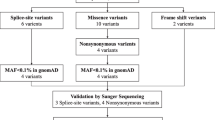Abstract
Heterozygous HTRA1 mutations, recently, have been reported as a cause of autosomal dominant hereditary cerebral small vessel disease (CSVD). We herein describe clinical and neuroimaging findings in two familial CSVD with two different heterozygous HTRA1 mutations. Detailed clinical and neuroimaging examination were conducted in probands and their available family members. A next-generation sequencing-based comprehensive gene panel was used to investigate their causative mutations. A novel heterozygous missense variant c.527T>C (p.V176A) and a novel heterozygous nonsense variant c.589C>T (p.R197X) in HTRA1 gene were detected in probands of family 1 and family 2, respectively. Co-segregation analysis in family 1 showed eight family members were mutation carriers. All alive male patients showed typical clinical and neuroimaging features of CSVD. All alive female mutation carriers were clinical or neuroimaging asymptomatic. Screening of HTRA1 should be considered in patients with familial CSVD. A male predominance may exist in patients with heterozygous HTRA1 mutations and need to be further investigated.


Similar content being viewed by others
References
Pantoni L (2010) Cerebral small vessel disease: from pathogenesis and clinical characteristics to therapeutic challenges. Lancet Neurol 9(7):689–701. https://doi.org/10.1016/S1474-4422(10)70104-6
Yamamoto Y, Craggs L, Baumann M, Kalimo H, Kalaria RN (2011) Review: molecular genetics and pathology of hereditary small vessel diseases of the brain. Neuropathol Appl Neurobiol 37(1):94–113. https://doi.org/10.1111/j.1365-2990.2010.01147.x
Hara K, Shiga A, Fukutake T, Nozaki H, Miyashita A, Yokoseki A, Kawata H, Koyama A, Arima K, Takahashi T, Ikeda M, Shiota H, Tamura M, Shimoe Y, Hirayama M, Arisato T, Yanagawa S, Tanaka A, Nakano I, Ikeda S, Yoshida Y, Yamamoto T, Ikeuchi T, Kuwano R, Nishizawa M, Tsuji S, Onodera O (2009) Association of HTRA1 mutations and familial ischemic cerebral small-vessel disease. N Engl J Med 360(17):1729–1739. https://doi.org/10.1056/NEJMoa0801560
Verdura E, Herve D, Scharrer E et al (2015) Heterozygous HTRA1 mutations are associated with autosomal dominant cerebral small vessel disease. Brain 138(8):2347–2358. https://doi.org/10.1093/brain/awv155
Nozaki H, Kato T, Nihonmatsu M, Saito Y, Mizuta I, Noda T, Koike R, Miyazaki K, Kaito M, Ito S, Makino M, Koyama A, Shiga A, Uemura M, Sekine Y, Murakami A, Moritani S, Hara K, Yokoseki A, Kuwano R, Endo N, Momotsu T, Yoshida M, Nishizawa M, Mizuno T, Onodera O (2016) Distinct molecular mechanisms of HTRA1 mutants in manifesting heterozygotes with CARASIL. Neurology 86(21):1964–1974. https://doi.org/10.1212/WNL.0000000000002694
Di Donato I, Bianchi S, Gallus GN, Cerase A, Taglia I, Pescini F, Nannucci S, Battisti C, Inzitari D, Pantoni L, Zini A, Federico A, Dotti MT (2017) Heterozygous mutations of HTRA1 gene in patients with familial cerebral small vessel disease. CNS Neurosci Ther 23(9):759–765. https://doi.org/10.1111/cns.12722
Sondergaard CB, Nielsen JE, Hansen CK, Christensen H (2017) Hereditary cerebral small vessel disease and stroke. Clin Neurol Neurosurg 155:45–57. https://doi.org/10.1016/j.clineuro.2017.02.015
Nozaki H, Nishizawa M, Onodera O (2014) Features of cerebral autosomal recessive arteriopathy with subcortical infarcts and leukoencephalopathy. Stroke 45(11):3447–3453. https://doi.org/10.1161/STROKEAHA.114.004236
Chen Y, He Z, Meng S, Li L, Yang H, Zhang X (2013) A novel mutation of the high-temperature requirement A serine peptidase 1 (HTRA1) gene in a Chinese family with cerebral autosomal recessive arteriopathy with subcortical infarcts and leukoencephalopathy (CARASIL). J Int Med Res 41(5):1445–1455. https://doi.org/10.1177/0300060513480926
Mendioroz M, Fernandez-Cadenas I, Del Rio-Espinola A et al (2010) A missense HTRA1 mutation expands CARASIL syndrome to the Caucasian population. Neurology 75(22):2033–2035. https://doi.org/10.1212/WNL.0b013e3181ff96ac
Bianchi S, Di Palma C, Gallus GN, Taglia I, Poggiani A, Rosini F, Rufa A, Muresanu DF, Cerase A, Dotti MT, Federico A (2014) Two novel HTRA1 mutations in a European CARASIL patient. Neurology 82(10):898–900. https://doi.org/10.1212/WNL.0000000000000202
Truebestein L, Tennstaedt A, Monig T et al (2011) Substrate-induced remodeling of the active site regulates human HTRA1 activity. Nat Struct Mol Biol 18(3):386–388. https://doi.org/10.1038/nsmb.2013
Tateoka T, Onda H, Hirota K, Kasuya H, Shinohara T, Kinouchi H, Akagawa H (2016) Unusual case of cerebral small vessel disease with a heterozygous nonsense mutation in HTRA1. J Neurol Sci 362:144–146. https://doi.org/10.1016/j.jns.2016.01.037
Acknowledgments
We are indebted to the patients and their family members for participation in this project.
Funding
This study was supported by the National Natural Science Foundation of China (Proj. No. 81201722).
Author information
Authors and Affiliations
Corresponding author
Ethics declarations
This study was approved by the Research Ethics Committees of the Sir Run Run Shaw Hospital, Zhejiang University School of Medicine. All patients and their family members provided written informed consent for participation in this study.
Conflict of interest
The authors declare that they have no conflict of interest.
Rights and permissions
About this article
Cite this article
Zhang, Wy., Xie, F. & Lu, Pl. Two novel heterozygous HTRA1 mutations in two pedigrees with cerebral small vessel disease families. Neurol Sci 39, 497–501 (2018). https://doi.org/10.1007/s10072-017-3231-z
Received:
Accepted:
Published:
Issue Date:
DOI: https://doi.org/10.1007/s10072-017-3231-z




